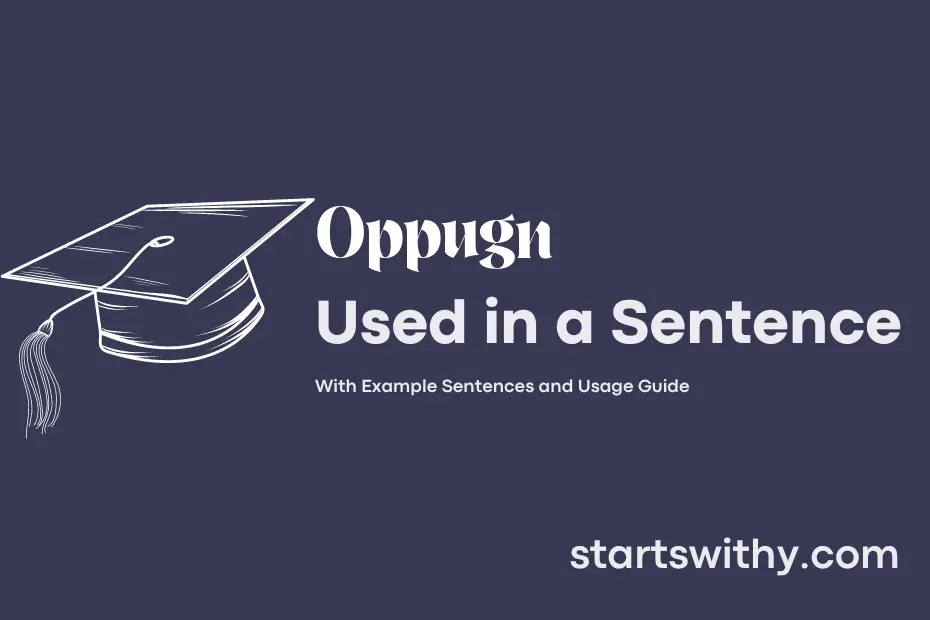Have you ever encountered a word that left you feeling puzzled about its meaning or usage? Let’s demystify one such word together – “oppugn.” To put it simply, to oppugn is to challenge or dispute something, often in a confrontational or argumentative manner.
Commonly seen in debates, legal proceedings, or philosophical discussions, the term “oppugn” captures the essence of raising objections or criticisms against a certain idea, belief, or statement. It involves questioning the validity or truthfulness of something, sparking a back-and-forth exchange aimed at ultimately proving one’s point or disproving the other party’s stance.
7 Examples Of Oppugn Used In a Sentence For Kids
- Oppugn means to question or challenge something.
- It’s okay to oppugn ideas and learn new things.
- When you wonder about something, you can oppugn it.
- You can oppugn a belief by asking respectful questions.
- Remember to listen when someone oppugns something you say.
- It’s important to be curious and oppugn information.
- Let’s oppugn stories to find out more about them.
14 Sentences with Oppugn Examples
- Oppugn the professor’s theory in your next research paper.
- It’s important to oppugn the data presented in your classmate’s presentation.
- Don’t be afraid to oppugn traditional societal norms in your discussions.
- As a college student, it’s essential to oppugn different perspectives in your academic essays.
- Challenge your friends to oppugn your study methods for better results.
- Oppugn the ethical implications of the research studies you come across.
- Use critical thinking skills to oppugn the validity of the statistics provided in your textbooks.
- Encourage your peers to oppugn the status quo in group discussions.
- Before accepting a new theory, make sure to oppugn it thoroughly.
- Take the opportunity to oppugn your own biases in your academic work.
- Engage in respectful debates where you can oppugn different viewpoints.
- Research thoroughly before you oppugn a well-established theory.
- Oppugn the relevance of certain topics in your curriculum to broaden your knowledge.
- Embrace the chance to oppugn your assumptions and beliefs through your college experiences.
How To Use Oppugn in Sentences?
To Oppugn means to challenge or question something, often with the intention of proving it wrong or incorrect. Here are some tips on how to use this word in a sentence:
-
Start by identifying a belief, statement, theory, or idea that you want to challenge or question.
-
Next, construct a sentence that clearly expresses your opposition or doubt towards that belief. For example: “She decided to oppugn the validity of the research findings by conducting her own experiments.”
-
You can also use oppugn in a more general sense to convey the idea of questioning or disputing something. For instance: “The prosecutor continued to oppugn the defendant’s alibi during cross-examination.”
-
Remember to use proper grammar and context when incorporating oppugn into your sentence. Make sure the sentence is clear and concise to effectively communicate your challenge or opposition.
-
Practice using oppugn in various sentences to become more familiar with its usage and to improve your vocabulary.
In conclusion, oppugn is a powerful word that can be used to express skepticism, doubt, or opposition towards a statement or idea. By following these simple guidelines, you can effectively incorporate oppugn into your writing and communication.
Conclusion
In conclusion, sentences containing the word “oppugn” are characterized by a challenge or contradiction to an idea or belief. These sentences often express doubt, skepticism, or a desire for clarification. By questioning the validity or credibility of a statement, the use of “oppugn” highlights a critical perspective that prompts further examination or debate.
Whether used in literature, academic writing, or everyday conversation, sentences with “oppugn” serve as a tool for expressing skepticism and inviting discussion. Engaging with such sentences can lead to a deeper understanding of different viewpoints and foster critical thinking skills.



